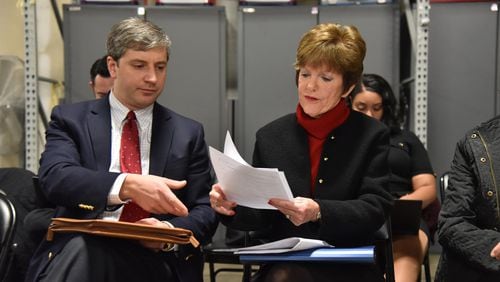The Fulton County election board's vice chairman abstained from voting to re-certify results from the Atlanta mayor's race on Saturday, arguing that the board hadn't adequately addressed questions about the validity of votes from recently annexed areas of the city.
The meeting of Fulton County election board that re-certified Kiesha Lance Bottoms as Atlanta mayor-elect further muddied a contentious election that appeared to be on the brink of a drawn-out court battle.
The board’s attorney did not attend, and members struggled to make sense of complicated legal matters, prompting an admonition from a City of Atlanta deputy clerk for the board to meet in private “in anticipation of legal action.”
“We have public comments that there have been irregularities,” said David J. Burge, one of two Republicans on the board. “I think it behooves this board to very clearly demonstrate that this was done right. We are meeting at an odd time, without our lawyers.”
But the votes from the annexed areas aren’t the only concern. The competence, or lack thereof, of the local post office may also play a role in any challenge from Mary Norwood, the candidate whom Bottoms defeated.
On Saturday, the board’s executive director, Rick Barron, said in an interview the board received a number of absentee ballots that were not counted because they arrived after the Dec. 1 deadline. Barron did not know how many.
Barron blamed chronic problems with Atlanta’s post office and noted that last week Atlanta’s postmaster was replaced.
Norwood’s attorney, Vincent Russo, first learned of the issue from a reporter.
“This is the first we’ve heard about it,” Russo said. “I don’t know why they wouldn’t have notified people about this issue and tried to get a court to accept them.”
An official recount on Thursday requested by Norwood gave her an additional five votes and subtracted six from Bottoms. But Bottoms was still more than 800 votes ahead of Norwood in the race.
In the days after the runoff, Norwood's campaign announced it was investigating reports of irregularities at the polls.
Last week, Russo argued that people in five recently annexed areas of Atlanta should not have been allowed to vote in the election. He argued that recent Georgia Supreme Court decision, along with a state Supreme Court transfer order issued days before the election, invalidated the ordinances establishing the annexations.
The areas are all located in southwest Atlanta, a part of town that Bottoms won.
The largest of the areas is Loch Lomond, which according to the city, has nearly 700 people. On Saturday, election board registration chief Ralph Jones, said roughly 400 hundred registered voters live in the area and that the board was still determining how many people in Loch Lomond voted in the mayor’s race.
In the summer of 2016, the city passed ordinances annexing areas in south Fulton County. The annexations prompted two lawsuits.
In one of those, the State Supreme Court in June upheld a state law incorporating the City of South Fulton and said that in order to comply with that law Atlanta’s annexations should have occurred before July 1, 2016. Therefore, the annexations were invalid.
Last month, the state’s highest court declined to take up a lawsuit challenging the Loch Lomond annexation because it had already decided the issues involving the case. In a Nov. 29 transfer order, the court said in light of its recent decision, the appeals court now had jurisdiction.
On Saturday, the board did not explain why its lawyer did not attend. Election Board Chairman Mary Carol Cooney did say that the board’s attorneys were not yet ready to opine on the Loch Lomond issue.
Barron said that his staff put Loch Lomond within Atlanta’s boundaries at the direction of the city, on whose behalf Fulton County had conducted the election.
Forest Webb, Atlanta’s deputy city clerk, urged the board to stop openly discussing the matter.
Legal action looms
The City of Atlanta has hired Allegra Lawrence-Hardy, of the Lawrence-Bundy law firm to represent it in the event of a lawsuit challenging the election results. According to a city spokesperson, Lawrence-Hardy worked on the team that represented Al Gore during the 2000 presidential election.
Norwood hasn’t said if she will sue.
State law allows a candidate to contest the result of a race in the event of irregularities, fraud and counting errors, along with other instances.
A court can only order a new election if the irregularities were so significant “as to place in doubt the result of the entire primary, election or runoff.”
Norwood has five days to contest the election results.
This is the second narrow mayor’s race that Norwood has lost.
After she lost the 2009 mayor’s race by 714 votes, Norwood, a self-described “progressive independent” convinced the Republican Party to appoint her to the Fulton County Board of Elections and Registration, according to an audio recording from a talk Norwood gave to a group of young Republicans in Buckhead earlier this year.
On that recording, Norwood accuses Reed's 2009 campaign of voter manipulation — an allegation that prompted Reed to threaten to sue — and takes partial credit for hiring Barron.
“And he is a consummate professional,” Norwood said, according to the recording. “I mean this guy is really good. He is so good that some people at city hall tried to get him fired about a year ago.”
About the Author






